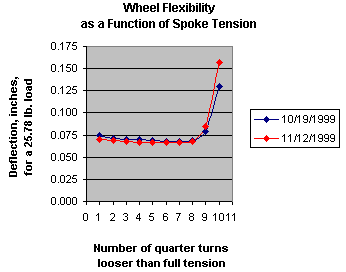


 |
 |
 |
|
#16
|
||||
|
||||
|
Same tension but a thinner spoke -> higher stress -> higher risk of failure; or other way around: Thinner spoke with same stress -> less tension -> softer wheel
__________________
Jeremy Clarksons bike-riding cousin Last edited by martl; 04-12-2024 at 07:20 AM. |
|
#17
|
|||
|
|||
|
Quote:
Thinner spokes also have lower ultimate yield strengths (tension at which they break), but I've never seen or heard of a spoke breaking in tension except in a crash. This is why straight gauge spokes break more often than butted ones - straight gauge spokes, when they go slack, force all of that cyclic stress to the spoke end, where butted spokes absorb some of it by bending in the middle. But it's best to avoid spokes unloading at all, which is why we like hubs with good geometry and why we put as much tension as we do on the drive side of rear wheels and the disc side of front disc wheels - so that the lesser-tensioned side doesn't go slack. I usually build rim brake front wheels at 90kgf, where I'll think nothing of putting nearly 1.5x that mount on a drive side rear. Last edited by November Dave; 04-12-2024 at 08:30 AM. Reason: clarity |
|
#18
|
|||
|
|||
|
Quote:

|
|
#19
|
|||
|
|||
|
Trying to understand this thread is making my head hurt, LOL!
Fortunately the only think I really need to know if getting a new wheel built is to give OldPotatoe a hollar! 
|
|
#20
|
|||
|
|||
|
We are very fortunate to have highly experienced independent wheel builders, industry leaders/professionals, and engineers all contributing to this discussion. Thanks to everyone for the collaborative atmosphere!
Greg |
|
#21
|
|||
|
|||
|
The reason that low static tension spokes are more prone to breakage isn't because they move around in the hub. The reason low tension spokes break is because it is more difficult to adequately stress relieve a spoke at low static tension, and because spokes at low static tension don't bed into the flange hole as well as spokes at higher tension. Tying and soldering don't effect either of these. And like martl says, tying and soldering may affect the spokes' ability to independently stretch to absorb wheel loads.
|
|
#22
|
|||
|
|||
|
Quote:
As far as tension affecting wheels stiffness, this was tested in Damon Rinard's Wheel Stiffness Test. The effect of tension on wheel stiffness was the first question he addressed in the test: Quote:

|
|
#23
|
||||
|
||||
|
My take, lowest weight at the rim. Use lightest rim, lightest tire. Lightest inner tube. If the rim is shallow use higher spoke count. . Wider rims are stiffer. This will produce faster spin up but lighter rims may not hold speed, may require constant engagement. Flame on......
__________________
Cuando era joven |
|
#24
|
|||
|
|||
|
Quote:
|
|
#25
|
|||
|
|||
|
Quote:
Next time you're in a smoking paceline and you get too close to the rider in front of you, just hold an outstretched palm outside of your hip and see what that does to your ability to hold speed! |
|
#26
|
||||
|
||||
|
Quote:
But, what do I know, I just build them. Even tho I was a pilot, I didn't know the Bernoulli's of why the airplane flew. "Pull back on stick, airplane went up, pull further back, airplane went down" 
__________________
Chisholm's Custom Wheels Qui Si Parla Campagnolo |
|
#27
|
|||
|
|||
|
need some Potato wheels, this is clear.
|
|
#28
|
|||
|
|||
|
Rode a set of mine yesterday!

|
|
#29
|
||||
|
||||
|
__________________
Chisholm's Custom Wheels Qui Si Parla Campagnolo |
 |
|
|